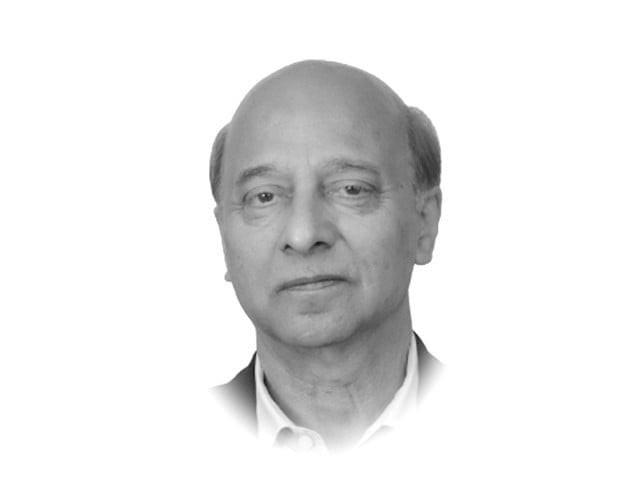South Asian politicians’ quest for absolute authority
BJP spokesperson Harish Khurana slammed the Delhi government over its claims

W
hat is currently common to ruling leaders in major South Asian nations – Bangladesh, India and Pakistan in particular? Arbitrariness, the propensity to flout democratic norms, disregard social norms and muzzle opposition (political as well as civil society including the press). There is an insatiable quest for authority and desire to trump the opposition – whether in India or here in Pakistan.
Even a well-placed majority government in the largest democracy – India – resorts to Presidential Ordinances when it feels threatened or wants to assert itself over rivals even when it amounts to trumping the Supreme Court. In a case relating to powers of the central and New Delhi’s government the Supreme Court had recently ruled that the Aam Aadmi Party (AAP)-led Delhi government has the control over bureaucrats assigned to departments under its purview. But the central government responded (May 19) with an ordinance that restores to it the power over ‘services’ in the National Capital Territory. The ordinance also strengthened the position of the lieutenant governor, making him the final authority who can act in their “sole discretion” in deciding the matters relating to transfer and posting of bureaucrats.
“The central government brought an ordinance late last night to kill democracy and the Constitution... [They brought it] in the dark of night at 11pm after the Supreme Court went on summer vacation. Even they (Centre) know that the ordinance is unconstitutional, and the SC will strike it down,” said Atishi Marlena, Delhi’s education minister.
“Delhi is such a small territory. The government of Delhi already has limited powers because it does not control land, police and public order. But Modi ji tries to curtail even the limited powers of the Delhi government through unconstitutional and illegal means which means that he is afraid of Kejriwal,” said Atishi.
At a press conference on May 19, Chief Minister Arvind Kejrival said the Centre doesn’t obey the court and it doesn’t care about the constitution or the laws of the country and that is why it brought the Ordinance.
BJP spokesperson Harish Khurana slammed the Delhi government over its claims. “We all should understand why this ordinance was brought. Arvind Kejriwal does corruption and if an officer stops him, the officer will be beaten up. The lock of an officer’s room was broken at 2am and documents were photocopied to destroy evidence. Officers were intimidated and threatened that their career would be destroyed. It was bringing embarrassment to the national capital.”
So much for India’s internal power politics. Another distinction of the socio-political landscape in these societies revolves around the issue of corruption of those in opposition.
The National Accountability Bureau (NAB) in Pakistan is a case in point. All opposition parties have suffered it every now and then. No surprise it is dubbed as a tool for “political engineering and intimidation”.
Its founding chairman, General Syed Mohammad Amjad, had seen this through and, within months of its initiation, advised General (late) Pervez Musharraf to wrap it up. He had cautioned it would be used for victimising the opposition. Precisely this has happened in the last quarter of a century.
A controversial body headed by a retired general, NAB has been instrumental in implicating a number of former presidents and prime ministers – Benazir Bhutto, Nawaz Sharif, Yousaf Raza Gillani, Shehbaz Sharif, Asif Ali Zardari – as well as their close associates. Strangely, almost all cases evaporated in thin air the moment the incumbents walked in to houses of political power.
The latest target of NAB, whose powers have been diluted and the nature and scope of corruption redefined under the PDM government, is now Imran Khan and some of his associates.
The past baggage has irreparably tainted NAB. Controversy accompanies its actions since April 9 (change of government). And the present status – with a general on the top following the resignation of an honest person like Aftab Sultan – hardly inspires any public confidence in the institution.
Does a government actually gain something at all out of a stigmatised institution? It hardly does. And do all those leaders currently in power take the common people for fools? Hard to hoodwink them any more so why then perpetuate NAB? However loud they scream, the perception of a compromised institution – designed to nail down opposition – is all too pervasive to dismiss.
No surprise that most south, central Asian and Muslim nations figure prominently – from bottom to top though – of nations that reel from whimsical, autocratic and populist but self-centred leadership that obstructs improvement in governance and globally acknowledged rule of law indices.
An aggravating external factor, nevertheless, has been geopolitics; the US-Egypt alliance or the Indo-US strategic partnership as well as geo-economic considerations that guide bilateral and multilateral alliances such as G-7, G-20, QUAD, AUKUS, BRICS (to a lesser extent). Had that not been the case, leading NATO members – the US, the UK, Germany, Australia i.a. – wouldn’t attend the G20 Tourism Working Group meeting held at Srinagar on 22-24 May, particularly after the UN’s Fernand de Varennes warned that this amounted to legitimising Indian actions in Kashmir to the context of unresolved resolutions on the disputed status of the Muslim-majority state. But geopolitical expedience dictates selective application of principles on fundamental democratic rights. That is a reality that Palestinians, Egyptians, Pakistanis and many non-Hindu minorities in India must live with.
Published in The Express Tribune, May 29th, 2023.
Like Opinion & Editorial on Facebook, follow @ETOpEd on Twitter to receive all updates on all our daily pieces.













COMMENTS
Comments are moderated and generally will be posted if they are on-topic and not abusive.
For more information, please see our Comments FAQ